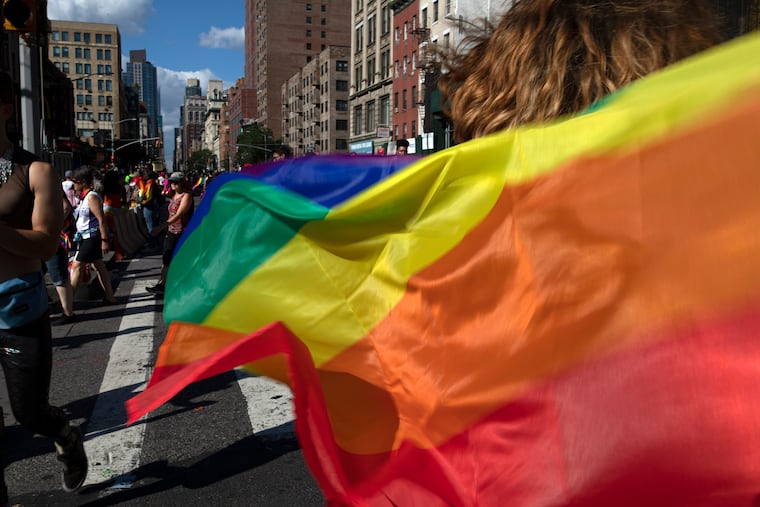Hindu Americans can lead in embracing the Equality Act | Opinion
This movement for equality isn’t just about how 2.5 million American Hindus put scriptures into practice.

In 2018, I helped organize a town hall for LGBTQ Hindus at a temple near Washington, D.C. While the response from the temple’s congregants was overwhelmingly positive, several folks emailed me asking why a town hall was necessary and why Hindus needed to talk about queer and trans community members.
I responded, “If our scriptures do, why shouldn’t we?” I noted our faith’s embrace of sexual and gender fluidity and queerness, and how several of Hinduism’s greatest stories, such as the Mahabharata and the Bhagavata Purana, have queer and trans characters.
» READ MORE: House passes Equality Act, prohibiting discrimination based on sexual orientation and gender identity
“Why shouldn’t we?” is also the attitude I hope to see from Hindu Americans in supporting the Equality Act, which the Senate could vote on this month. The act will update our nation’s civil rights laws to be inclusive of the LGBTQ community by barring discrimination based on sexual orientation and gender identity in areas like housing and employment, as well as extending protections for people across all types of discrimination to include federally funded programs and other aspects of public life. The legislation additionally expands protections for religious minorities.
More young Hindu Americans are coming out to their families while embracing both their faith and their gender/sexual identities as integral to their sense of self. Hindu parents who had long viewed discussions about sexuality as nothing more than theoretical exercises are now faced with critical decisions over their acceptance and support for their children (and other extended family). More Hindu temples are now officiating same-sex ceremonies and faith-based support groups for Hindu families with LGBTQ relatives have sprung up across the country, offering an opportunity for parents and children to embrace their Dharma and their identities. More Hindu or Hindu-based religious organizations — including sects with a strong local presence such as BAPS Swaminarayan Sanstha, the Hindu American Foundation, and the Art of Living — have come out in support for LGBTQ equality (including conducting same-sex weddings), providing more institutional backing for integrating queer and trans rights into the community’s social practices.
» READ MORE: ‘They just want the chance to play’: Reject transgender sports bans | Opinion
Most of the stigmas associated with same-sex relationships that have permeated Abrahamic notions of sexuality don’t exist in the texts of Hinduism and other Dharmic traditions like Buddhism and Jainism. Hinduism has several millennia of scriptures and traditions that discuss and celebrate queerness and gender fluidity. Yet, many Hindus choose to ignore or downplay that history. While not always as openly hostile, this homophobia is nonetheless as pernicious because it marginalizes queer identities, makes LGBTQ individuals invisible within our social fabric, and sometimes manifests as outright hate and discrimination.
A pillar of Hindu scriptures is seeing the Divine in all beings (though Advaita and Dvaita interpretations of divinity differ on how that is manifest). This is why my fellow Hindu Americans can play a leading role in helping to push for passage of the Equality Act, which guarantees LGBTQ Americans the same right to pursue their dreams and their love without fear of discrimination and oppression. This isn’t just about human and civil rights; it’s about treating everyone — regardless of how they identify and who they love — with divine respect.
» READ MORE: Indian Americans offer a hand at Philly vaccination sites as COVID-19 threatens loved ones an ocean away
This movement for equality isn’t just about how 2.5 million American Hindus put scriptures into practice. For years, Hindus have been largely left out of the American conversation on social change, and in grassroots activism, the Hindu presence is still largely absent. The Hindu American community can not only join other faith communities but can take the lead on how to embrace everyone as equally divine. The Equality Act presents two momentous opportunities for Hindus: to help push for the legislation that puts our highest ideals into practice and to emerge from the shadows when it comes to religious voices for change.
Many of us aim to live by the ancient Hindu verse Vasudhaiva Kuṭumbakam — “the world is one family.” Supporting the successful passage of the Equality Act would simply enshrine that timeless scriptural truth into law.
It is my hope and prayer that our collective Dharma will inspire us to work together to make this happen. I ask my fellow Hindu Americans to raise their voices in support of LGBTQ rights alongside people of all religious backgrounds who want to ensure a more just and equitable society.
Murali Balaji is an academic, diversity, equity, and inclusion thought leader, and former journalist who has worked for and with numerous Hindu organizations. He is a lecturer at the University of Pennsylvania.